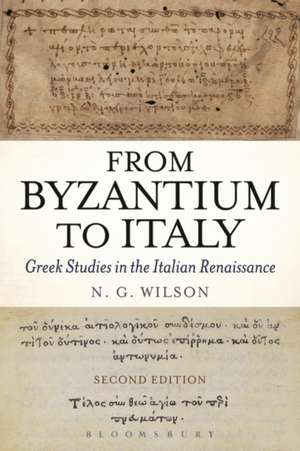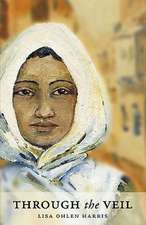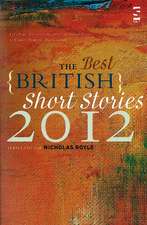From Byzantium to Italy: Greek Studies in the Italian Renaissance
Autor Professor N. G. Wilson, F.B.A.en Limba Engleză Paperback – 16 noi 2016
Preț: 218.00 lei
Preț vechi: 244.93 lei
-11% Nou
Puncte Express: 327
Preț estimativ în valută:
41.72€ • 43.31$ • 34.79£
41.72€ • 43.31$ • 34.79£
Carte tipărită la comandă
Livrare economică 24 martie-07 aprilie
Preluare comenzi: 021 569.72.76
Specificații
ISBN-13: 9781474250474
ISBN-10: 1474250475
Pagini: 248
Dimensiuni: 156 x 234 x 20 mm
Greutate: 0.36 kg
Ediția:2
Editura: Bloomsbury Publishing
Colecția Bloomsbury Academic
Locul publicării:London, United Kingdom
ISBN-10: 1474250475
Pagini: 248
Dimensiuni: 156 x 234 x 20 mm
Greutate: 0.36 kg
Ediția:2
Editura: Bloomsbury Publishing
Colecția Bloomsbury Academic
Locul publicării:London, United Kingdom
Caracteristici
Vividly uncovers the lives and work of Byzantine scholars, writers and historians who helped to preserve the Classics for a modern reader today
Notă biografică
N. G. Wilson is Emeritus Fellow of Lincoln College, University of Oxford, UK. He has published widely on Greek palaeography, textual criticism and the history of classical scholarship including Scholars of Byzantium (1983), revised ed. (1996).
Cuprins
Preface to the First EditionAbbreviations1. The Beginningsi.Precursorsii. Petrarch, Boccaccio and Pilato2. Chrysoloras: methods of learning the language3. Bruni and other early translators4. Consolidationi. A first glance at Veniceii. The significance of the year 1423: Aurispaiii. The second half of Bruni's careeriv. Traversari5. Vittorino da Feltre6. Guarino7. Filelfo8. Greek prelates in Italyi. The Council of Florence (1439) and its consequencesii. The Greek cardinal9. Valla10. Rome under Nicholas V and his successors11. Florence in the second half of the centuryi. Argyropoulosii. Ficinoiii. Scholar-printers: Chalcondyles and Janus Lascaris12. Politian13. Padua, Bologna, Ferrara and Messina14. Venicei. Ermolao Barbaro and Pietro Bemboii. The Aldine Publishing house , the Neakademia and Forteguerri's manifestoiii. The publications of the first ten yearsiv. Interruptionsv. Musurus15. ConclusionNotesIndexes
Recenzii
An essential introduction to the reception of classical Greek literature in humanist Italy . It remains a pleasure and a thrill to read this book. Wilson's language is clear and concise. The author focuses on the essential but still enlivens the narrative with enjoyable and exciting anecdotes without ever losing the thread of his argument. He finds the right balance between sticking to facts and launching hypotheses on the basis of possible relations and links. In the age of companions and conference proceedings, this monograph particularly captivates thanks to the homogeneity of its contents and themes, as well as the sharpness of its focus.
This second edition of From Byzantium to Italy (the first appeared in 1992) stands as a welcome testament to this study's enduring relevance, and its updated notes evince attention to recent research concerning the most influential figures and texts . All professional scholars and graduate students whose research relates to the classical tradition will find food for thought here. Similarly, advanced undergraduates, and particularly those writing theses, will profit from and enjoy this study.
This elegant history is peppered with delights ... [A] learned and highly readable book.
From Byzantium to Italy remains one of the most remarkable studies on the survival of Greek culture in the West. It is an admirably concise and elegantly written book. Anyone interested in the reception of Antiquity in the Renaissance should read it.
This is the most important account of how classical Greek literature was transferred om the Greek world to the Latin West during the Italian Renaissance. Written by an eminent authority on the history of classical scholarship, this updated edition provides a rich historical context and a wealth of concrete examples illustrating this key episode in the cultural history of Western civilization.
This book, in its new paperback format, will undoubtedly be of use to scholars of translation and graduate students as a starting point for their work on particular translators or individual works.
An indispensable reference for any scholar interested in studying the transmission, reception and import of ancient Greek texts in Renaissance Italy . With this study, Wilson shares his impressive erudition and paleographical expertise offering an exemplary model for balancing concision with wealth of examples, for sketching the broader trends and introducing minute, yet relevant details.
This second edition of From Byzantium to Italy (the first appeared in 1992) stands as a welcome testament to this study's enduring relevance, and its updated notes evince attention to recent research concerning the most influential figures and texts . All professional scholars and graduate students whose research relates to the classical tradition will find food for thought here. Similarly, advanced undergraduates, and particularly those writing theses, will profit from and enjoy this study.
This elegant history is peppered with delights ... [A] learned and highly readable book.
From Byzantium to Italy remains one of the most remarkable studies on the survival of Greek culture in the West. It is an admirably concise and elegantly written book. Anyone interested in the reception of Antiquity in the Renaissance should read it.
This is the most important account of how classical Greek literature was transferred om the Greek world to the Latin West during the Italian Renaissance. Written by an eminent authority on the history of classical scholarship, this updated edition provides a rich historical context and a wealth of concrete examples illustrating this key episode in the cultural history of Western civilization.
This book, in its new paperback format, will undoubtedly be of use to scholars of translation and graduate students as a starting point for their work on particular translators or individual works.
An indispensable reference for any scholar interested in studying the transmission, reception and import of ancient Greek texts in Renaissance Italy . With this study, Wilson shares his impressive erudition and paleographical expertise offering an exemplary model for balancing concision with wealth of examples, for sketching the broader trends and introducing minute, yet relevant details.











